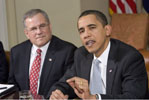
It seems that the White House is even able to admit – though that wasn’t the point of course – that its efforts on Sudan in the past year and a half are pretty sparse. In a fact sheet highlighting President Obama’s engagement in Africa on the occasion of a young African leaders forum this week in D.C., the White House pointed to the “actions” taken on Sudan:
— The Obama administration conducted a comprehensive review of our policies in Sudan and developed a strategy focused on addressing our multiple policy objectives in Sudan and the region, including resolution to the crisis in Darfur and implementing the Comprehensive Peace Agreement. We have named a full-time Special Envoy who has re-energized and broadened the multilateral coalition addressing Sudan’s challenges.
— In June 2010, Vice President Biden traveled to Egypt, Kenya, and South Africa to address important bilateral issues in addition to holding numerous in-depth discussions on looming challenges in Sudan and Somalia.
It might be more accurate to label this short list “rhetorical accomplishments.”
While it was certainly an important first step for the Obama administration to devise and introduce its new Sudan policy last October, the implementation plan put forth in its public statement on the policy appears to have fallen apart. The “comprehensive approach” unveiled by Secretary Clinton last October said:
Each quarter, the interagency at senior levels will assess a variety of indicators of progress or of deepening crisis, and that assessment will include calibrated steps to bolster support for positive change and to discourage backsliding. Progress toward achievement of the strategic objectives will trigger steps designed to strengthen the hands of those implementing the changes. Failure to improve conditions will trigger increased pressure on recalcitrant actors.
However, administration officials have distanced themselves from that plan, even as they acknowledge that there has been backsliding. And even within the U.S. policy making world, officials admit that they don’t know the plan for implementation. "I haven’t heard what the benchmarks are or what specifically will be done if they are not met," said Congressman Donald Payne (D-NJ), who serves as the chairman of the House Foreign Affairs Africa subcommittee. The special envoy himself publicly laments his view that the United States does not have leverage in Sudan, and sources say he has taken a back seat in the most crucial negotiations, such as the talks between North and South over implementation of the Comprehensive Peace Agreement and the faltering Darfur peace process.
Vice President Biden’s trip in June provided a much-needed boost in attention to the high stakes in Sudan, but his strong remarks will have little influence absent meaningful follow-up.
While it is encouraging to see that the White House seeks to highlight its dedication to delivering on the president’s moving words in Ghana about forging partnerships to tackle challenges like conflict resolution, the administration’s substance on the Sudan front leaves something to be desired.
Photo: President Obama appointed Sudan Special Envoy Scott Gration in March 2009 (AP)

